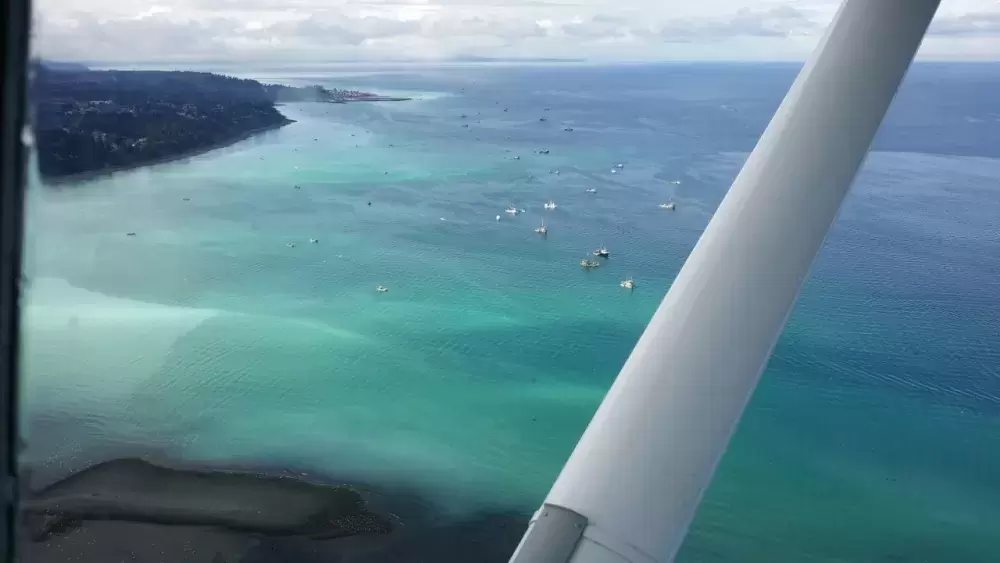Amid concerns from environmental groups of dwindling herring stocks off Vancouver Island, biologists monitoring the species are observing gradually improving populations.
In late October a collection of advocacy groups called for the immediate closure of the herring fishery in the Strait of Georgia – the only region on the B.C. coast that held a commercial harvest this year. On Oct. 29 the Sea Sheppard Conservation Society, Conservancy Hornby Island and the Association for Denman Island Marine Stewards cited “years of excessive quotas” off the island’s east coast that has resulted in a “dwindled” population. Herring are a keystone species in the Pacific, supporting salmon and other fish higher up in the food chain.
“If DFO is serious about protecting endangered chinook salmon and southern resident killer whales, the first step should be to protect what is left of their food supply,” said Ian McAllister, executive director of Pacific Wild, in a press release from Sea Sheppard. “Shutting the herring fishery down to let stocks recover should be the first course of action.”
Almost 123,000 tonnes of herring biomass of forecasted in the Strait of Georgia this year. Commercial vessels were permitted to cast their nets over less than two weeks in the spring, ending by the first week of April. This brief harvest focused on catching females carrying eggs, as herring roe is in high demand in Japan and China. Most of the fish caught are fed to livestock or ground into feed for aquaculture.
Harvest quotas were estimated to catch 20 per cent of the biomass, but the amount of fish in the Strait of Georgia ended up being on the low end of predictions from Fisheries and Oceans Canada, resulting in 25 per cent of the biomass being harvested. This is still within sustainable levels, says the DFO.
“For 2019, the forecasted range for the Strait of Georgia was 67,000 to 221,400 metric tonnes and the median was 122,921 tonnes,” wrote a DFO spokesperson in an email to Ha-Shilth-Sa. “The most recent data from the scientific surveys indicate that in fact, spawning biomass in the Strait of Georgia was closer to the bottom half of forecast range, resulting in a harvest rate of 25 per cent in 2019.”
Based on DFO’s spawn index, a measure of the procreating biomass of herring taken from dive surveys, Strait of Georgia numbers over the last decade peaked in 2016, with this year representing less than half of this high figure. But herring are a particularly difficult species to predict, with fluctuating population levels from one year to the next.
“Pacific herring forecasts are highly uncertain because factors such as environmental conditions and predation can vary from year to year,” said the federal department. “DFO has tested and implemented a harvest strategy that has a high probability of conserving the stock over the long term, despite the uncertainly associated with the variability of the stock.”
The west coast of Vancouver Island hasn’t supported a herring fishery in 14 years. Jim Lane, the central region biologist with Uu-a-thluk, said that Nuu-chah-nulth fisheries have advised the federal department to keep nets out of the water in 2020. Although DFO scientists have recommended to keep the west coast fishery closed, a final commitment is yet to come from the department.
“I’d be surprised if they opened it up on the west coast of Vancouver Island,” said Lane.
Since a historically low spawn index of 2,464 tonnes was recorded in 2010, annual assessments have increased – albeit with fluctuations. This year’s spawn index is 17,030 tonnes – down from the 28,107 tracked in 2018, but a slight increase from the 2017 number.
“Herring can go from very little to a massive amount,” said Lane.
Nuu-chah-nulth fisheries and the DFO have yet to agree upon what level stocks need to reach to sustain a commercial harvest, but Lane noted that it’s unlikely there will be enough herring on the west coast of Vancouver Island to carry a fishery in the next few years.







